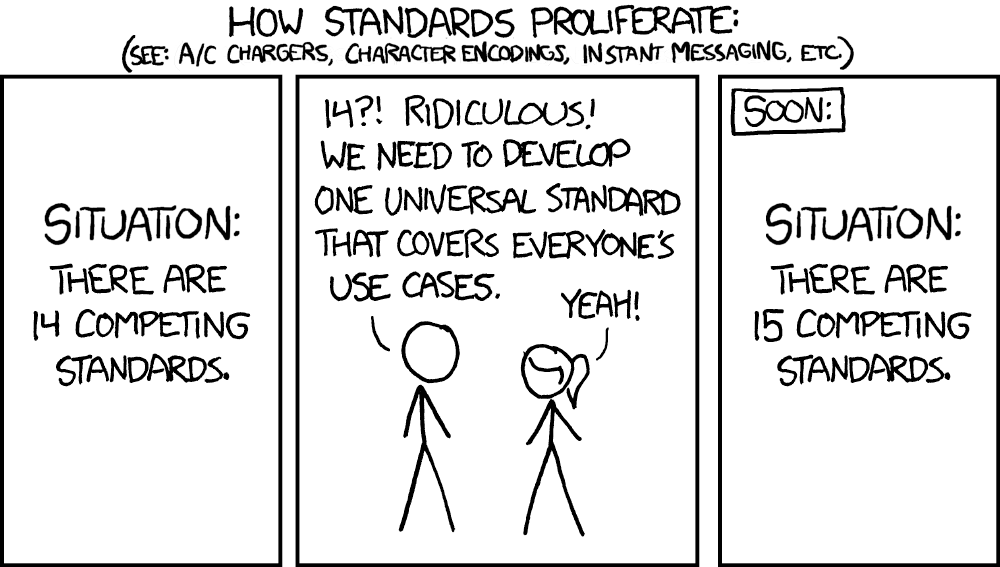Seriously. There’s so many floating around. It feels like there’s a cycle of
Random programmer thinks xyz language sucks -> she/he makes a slightly different, slightly faster, slightly more secure version -> by luck this gains mass adoption-> random programmer thinks new xyz language sucks
I propose when the revolution comes and the last guillotine falls we decide a general-purpose programming language that coders should stick to. I vote Lisp or any of the dialects (scheme, clojure, racket), but i also feel something about the Julia language for scientific research. Maybe we can decriminalize using C. Absolutely ban and hunt down the use of any of the hipster languages teenagers are into these days.
Nim? Zig? Crystal?? I am absolutely losing my damn mind. It compiles to bytecode people. Make up ur damn minds. To jail with all of u
such decisions will be made scientifically, without the liberal farce of the voting ritual.
it’s javascript
After the revolution we should just unify english. Theres so many spoken languages around.
Hearies when there’s more than one sign language type beat

Wish granted, Brainfuck
Language design and theory has made some legitimate gains over the past couple decades. And different languages have different strengths suited for different problems. I think the issue is that even people who agree with this aren’t gonna agree on the language to standardize on. It’s the XKCD comic.
In my communist future it’s all Torqur3D, Python, and BASIC. No, I do not know any of those.
When the revolution comes we need to unify tools
Hammer? Screwdriver? Spanner? One of these should be enough
Single handle with interchangeable heads.
Banning programming languages seems like a bad idea to me, humanity has come to regret all that language standardization and cultural genocide that happened with the imposition of one universal linguistic language. My official (so the communist position) on programming languages is let a thousand alternates to C+ bloom, then crush them all under the jackboot of the communist party. THEY WILL ALL BE THE LANGUAGE OF COMMUNISM!
there are 28 coding languages
“We need to invent a universal language that brings all these together so everybody can just use one”
there are 29 coding languages
deleted by creator
All these cutting edge new languages are just wrappers around the same C libraries some anonymous grad students wrote in the 70s funded by some tiny government grants.
All these cutting edge new languages are just wrappers around the same assembly code by Kathleen Booth in the 1940s for her university computer.
Unless you are writing a hard-realtume system, Common Lisp is the only language you will ever need.
Be quiet parentheses diddler,
(((((()((((((())((do-thing (())(())))))0(((who the fuck wants to look at that all day.But seriously tho how do you get used to the syntax? I’ve read some moderately complex Lisp code and it was very hard to read for me, do you just kinda get used to it over time or is there extra tooling involved?
OK fair point actually. You just gotta write some lisp code yourself (I’m a fairly new lisper although I had emacs for a while now and have dabbled in some elisp to edit my config) to appreciate how the parentheses are actually helpful when you write things. To read things, well-written lisp code will be properly indented, or else a reasonably powerful editor (emacs with sly, etc) is able to indent the code for you
Take a look at my (shameless plug) eratosthenes sieve function i wrote just yesterday
(defun range (start end) (if (< start end) (cons start (range (1+ start) end)))) ;; Checks if d is a factor of n (defun factorofp (d n) (zerop (rem n d))) ;; Sieve in lisp?? (defun sieve (n) (let ((primes (range 2 n)) (curprime 2)) (maplist (lambda (tail) (delete-if (lambda (n) (factorofp curprime n)) (cdr tail)) (setf curprime (cadr tail))) primes) primes))u don’t have to understand it. But the general principle is, things that are indented at the same level are arguments to the same function. In other words, notice that the
delete-ifand thesetfare indented together. So they must be part of the same “argument:” namely, the body of the anonymous functionlambda. So really, you don’t have to count the parentheses or anything. The indentation makes things clear and unambiguous.Other things that aid in reading are, obviously, patterns that you pick up along the way. Do not fear the parentheses. Embrace them
I can read it if I really focus but even with the nice indentation the syntax doesn’t make it easy, it’s probably way easier with proper syntax highlighting tho, whatever the Lemmy renderer did here seems wrong.
I still don’t really see why I would suffer the syntax over using a more readable language, I’ve heard this syntax makes the macro system way more elegant/powerful but I can’t see it being THAT much better than whatever other languages are doing.













